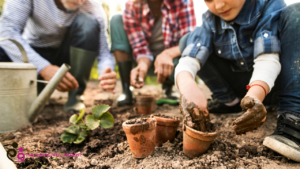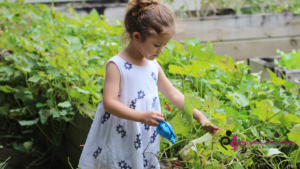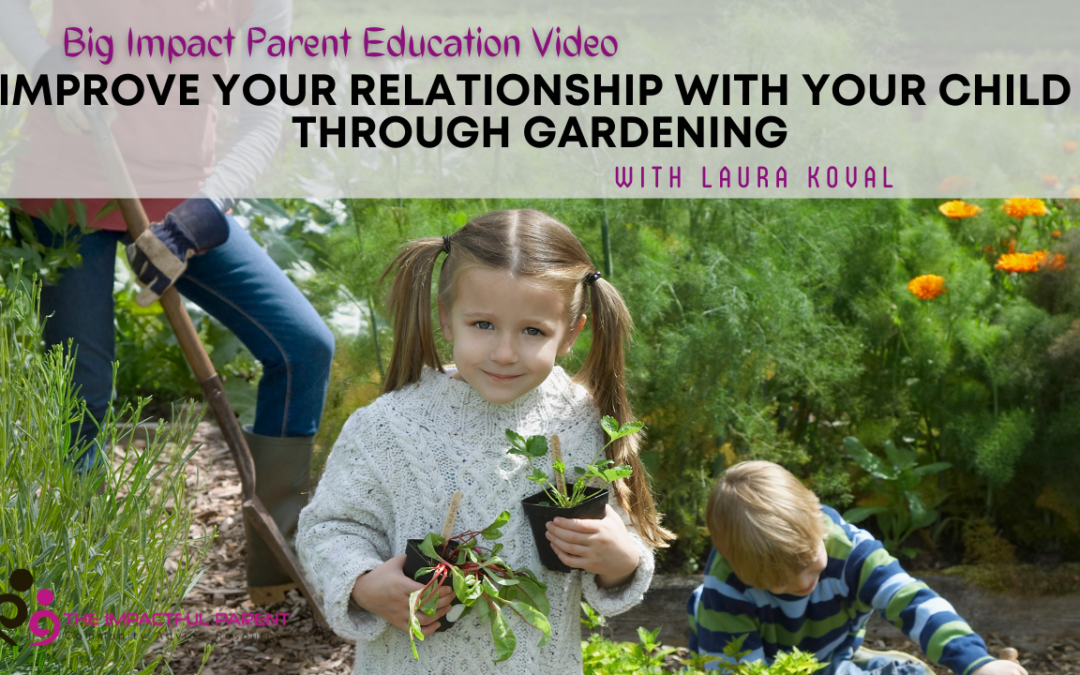Improve Your Relationship With Your Child Through Gardening
Video Transcript of Improve Your Relationship With Your Child Through Gardening:
Kristina: Welcome impactful parent. Today we’re going to talk about the positive impacts of gardening on your kids. Today I have a special guest, Laura Koval. Laura is a master gardener and owner of AbleVeg, a company that helps people create and maintain their backyard gardens. Not only that but, Laura is a mom of two boys, ages four and five.
Laura: Thank you for having me, Kristina. This is really fun.
Kristina: I’m excited to learn about gardening because I’ve always wanted to have a green thumb. Still, I’ll tell you right now, I am horrible at it! I can’t keep anything alive. Having said that, I really believe in growing your own food and the connection that plants can make for your kids. It is so beneficial. So tell me, what does AbleVeg do?
Laura: My business is to help people, just like you, who either want to get a garden started and don’t really know where to start or help people who have tried starting a garden and still feel like they’re not getting enough bang for their buck. So our goal is to get people set up with products, and then we also do private consultations. We get to know our clients, and we get to know their gardens. So as problems come up and questions come up, you’re never gardening alone.
Kristina: That’s awesome. Why do you think gardening is such a great activity for families?
Laura: We adopted our two kids about a year and a half ago from the foster care system. I’ve been a lifelong gardener, so for me, I grew up playing in the dirt with my parents and learning all about plants and how to grow them. When our kids came to us, they had been primarily on a fast-food diet for their early years. We all know with kids- getting them to eat healthfully is challenging enough, especially when they’re going through picky eating phases. Still, it really hit home for me that these kids had never eaten vegetables! They didn’t naturally like them! I think it’s important to give various food options to bridge nutritional gaps and stay healthy. I think when we went through COVID, we all realized that our food system is not perfect. There is great value in having a backyard garden and living a healthier lifestyle.
Kristina: I’m horrible at keeping anything except for my children alive. Are you sure that gardening, especially for people like me, will be a good idea?

Improve Your Relationship With Your Child Through Gardening
Laura: I’m really glad you’ve been successful in keeping your kids alive! I think what tends to happen is, people who have not grown up in a garden get excited to put things in the ground, and before you know it, their plants start dying. It is very frustrating! Then they feel bad and blame the death of their plants on their skill set. Soon, these people give up on gardening and don’t try again. There is a solution, though! There are ways to tailor your space and tailor your garden (and we’ll talk about that during the presentation a little bit) to set yourself up for success.
Kristina: You have a presentation for us! That sounds perfect. Let’s go ahead and get to that.
Laura: Gardening is great for the whole family. One of the biggest benefits of gardening is low impact exercise. It also helps combat loneliness. There’s lots of documentation on the mood-boosting benefits for adults who spend time in gardens. It’s considered to be something that can reduce your stress and helps cardiovascular health. People who are actively gardening see benefits in their entire body. It decreases the risk of dementia. There’s a really cool book called The Blue Zones, but the guy who wrote this book actually found these areas on the planet where people live to be 100 years and older. Gardening is one of the things that he recommends because of all of these added health benefits.
There are also benefits for your whole family! Gardening is an all-ages activity! Gardening gets people away from screens. Especially if you’ve been stuck at home with your kids this last year, TV and technology have become a babysitter. Gardening is a great opportunity to stop screen time and get your kids outside.
Gardening also drastically increases the number of vegetables that your family eats. This has been hugely helpful for our little ones because they’re way more excited to eat it on the table when they see it grow on the vine. Gardening also gets kids outdoors and in the dirt. When our grandparents were alive, they were dirty all the time. Gardening creates routines for kids. We have all seen our kid’s routines get disrupted and how impactful that is. Gardening is another great way to keep your child on a schedule. It also gives kids a sense of responsibility! My little ones love watering the garden. Usually, when they’re watering the garden, it means they’re filling up buckets and flooding out plants, but they want to help! Kids want to be helpful in the process. They get really excited to be gardening, planting seeds, and it gives them some autonomy in the family. Kids feel like they’re being helpful. It also enhances children’s fine motor development.
Gardening is also a real-life lesson in science and math! We talk a lot now about the importance of STEM learning with children, and this is real life, daily lessons in chemistry and math.
And the last big family benefit is that gardening engages all five senses for kids! Kids with sensory issues get lots of benefits because it engages them enough that it gives them focus. Kids are not just sitting at a screen or staring at the TV.
Kristina: There is definitely something special about touching nature. Gardening and getting outside is almost an immediate mood booster for anyone in your family.

Improve Your Relationship With Your Child Through Gardening
Laura: Now I want to get into some of the HOW-TOs of gardening, especially if you have never done this before.
These are called grow bags. (Photo in the video) They are made of felt-like material, but you can also use flowerpots. Using these items is called Container Gardening. Container gardening is a great way to get started with your family because it’s easy and fits anywhere. You just find whatever little spot of fun you have in your yard, you put your container there, and you can watch things grow. You can grow so much stuff in these containers! They are super easy for families because you just fill it up, and you can get started gardening! Many people make the mistake of digging up their backyard soil and grass. Still, Container Gardening is a really user-friendly way to get a garden started.
Next, find an online resource like the Farmers Almanac. It’ll let you put it in your city, and it gives you exact dates of what will grow and when to put it in the ground. It’s an easy guide, so you’re not just putting guesswork into when you’re going to plant things like peppers or tomatoes. It will let you know—definitely a great tool for beginners.
Kristina: Oh, I love that.
Laura: And then these are seeds that you can direct sow, meaning you just get your package of seeds, and they’re really easy to put in the ground. I encourage parents to get direct sow seeds because you see the whole process from start to finish. If you put those in the ground, radishes will actually leaf out within a few days, and you can harvest some of them in 30 days or less. It’s a quick turnaround time. Which can be really engaging for kids. You just take your little seed packet and go home. Your kids can help plant them. The nice thing here is when you buy seeds, they’re going to get packaged directions of exactly how to put them in and how far apart to grow them. It’s really fun for little ones.
Kristina: I noticed that you have beans on that list. Do you recommend a particular type of bean?
Laura: There are two general categories of beans. One is called a bush bean. It’s an eight-inch tall plant, and the beans grow off of that plant. The other variety is called pole beans. Pole beans will climb, which is kind of fun, especially for younger kids. My favorite one to grow is probably a Dragon Tongue bean. They are purple and yellow in color.
Now let’s talk about purchasing transplants. Transplants are already grown that you transplant into your garden. These are nice because you can get a head start on fruit or vegetable production since you’re not starting from a seed.
And then, the next step is just making a little plan for your space. Your kids can use graph paper and help you make measurements. Kids can also help you calculate how much space each plant needs and how far apart you need to sow each plant.
Kristina: I also want to mention to parents that gardening is a fantastic opportunity to connect grandparents with teenagers.
And being an impactful parent as you are, how has this affected your own children?
Laura: Well, I’m proud to say my children now eat cherry tomatoes unprompted. But they love those they love the piece that we’ve grown, they’re even really trying hard to like the lettuce right now. He’s doing his best. The poor little guy is just not quite there yet. I’ve seen my kids get excited about plans, vegetables, and their diets have changed. They are much healthier now. I’m going to be the first person to admit that I’m not the crafty mom. I’m not the mom who’s good at fantasy play. But I am the mom who can take my kids outside and show them the wonders of nature in the world. I have been able to spend quality time with children and connect with them through gardening.
Kristina: If my audience wants to know more and get your help with gardening, how can they contact you?
Laura: We are at Ableveg.com and offer free 10 minute consultations. Even if you only have a simple, quick question like, “Why do I keep killing my squash,” we’re happy to do that for you for free. We just want you to get started and start a legacy with your kids with gardening.
Kristina: Thank you for being on today, Laura. I really appreciate what you’re doing.
For more Impactful Parent content, SUBSCRIBE TO THE IMPACTFUL PARENT YOUTUBE CHANNEL. New videos are released each week. https://theimpactfulparent.com/youtube
Do you have a child that struggles with ANGER? I CAN HELP! The FREE webinar on my fully online course to help children with big emotions will give you the framework you need to see a change in your child’s behaviors! Check it out at https://theimpactfulparent.com/anger-webinar
PLUS- follow The Impactful Parent on social media and check out https://theimpactfulparent.com Free Resources and More Impactful Parent content on the website!
Facebook: www.facebook.com/theimpactfulparent
Instagram: www.instagram.com/theimpactfulparent
Pinterest: www.pinterest.com/theimpactfulparent
LinkedIn: www.linkedin.com/company/theimpactfulparent
Twitter: www.twitter.com/impactfulparent
Podcast: https://theimpactfulparent.com/parenting-podcast
Follow The Impactful Parent for more FREE tips and resources. Real advice. Real issues. Period. @theimpactfulparent Helping parents of school-age children.
Improve Your Relationship With Your Child Through Gardening

